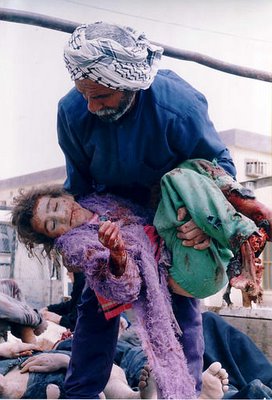Why America Goes to War

Two provocative documentaries, both from the left, offer their views of motives for the Iraq invasion
By RICHARD CORLISS
Dirty little secret: with rare exceptions, there's no such thing as a right-wing documentary. In some informal media Treaty of Versailles, conservatives got talk radio and most of cable-TV news; liberals got the nonfiction movie, which generally has a smaller audience, except when it's made by Michael Moore. Now, emerging from a long season of wounds licking after the 2004 election, the documentary left is back in the Iraq business with Adam Curtis' THE POWER OF NIGHTMARES and Eugene Jarecki's WHY WE FIGHT. Curtis is the agent provocateur of the two. In his 3-hr. BBC documentary, subtitled THE RISE OF THE POLITICS OF FEAR, he makes a breathless case that the US has shifted from a liberal democracy, pledging a better life for its citizens, to a threatening oligarchy, using the specter of alien enemies (lately al-Qaeda) to keep the public in fretful subjugation. He also argues that American neoconservatives have exaggerated the danger posed by Islamic jihadists. The argument, buttressed with a sassy use of news footage and clips from old films and TV shows, zips along with the confident menace of an old horror film. Indeed, with its many questionable rhetorical devices, it's best viewed as a work of docufiction. On that level, though, the movie has it's own nightmare power.
In the much calmer WHY WE FIGHT, the improbably hero is Dwight Eisenhower. As Supreme Allied Commander of World War II, he opposed dropping the atom bomb on Hiroshima, according to his son John, who is interviewed in the film. In his 1961 farewell address as President, Eisenhower cautioned against the sprawling "military industrial complex." To Jarecki (THE TRIALS OF HENRY KISSINGER), Eisenhower was a Cassandra unheeded. In the years since Ike issued his warning, the military budget has grown exponentially, and the complex is even more complex, embracing the Pentagon, the arms industry, Congress think tanks and a large slice of the media.
So why do we fight? Because, Jarecki argues, we have all these cool multibillion dollar toys, and we have to play with them somewhere. Iraq is seen as the great playground, both for the weapons and the neocons' vision of a reliable U.S. client state in the Middle East. The second part of this equation awaits history's verdict; the first part didn't work out at all. Iraq has turned out to be an old-fashioned war, one carried out by foot soldiers on dangerous patrol. The toys are not nifty long-range missiles but G.I. Joes: human beings at fatal risk.
Like a PBS Frontline special, but with a bit more attitude, WHY WE FIGHT makes a cogent case against the Iraq adventure. The film is, of course, a handbook for the converted. Those in agreement will see it; those opposed to it will ignore it. That is the fate of political documentaries in an age when the left mostly talks to itself.

0 Comments:
Post a Comment
<< Home